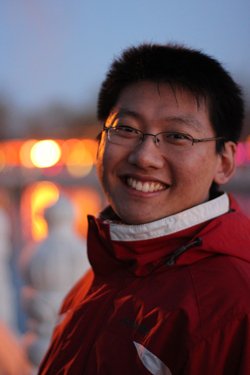Xiang Gao
2015 Regional Award Finalist — Post-Doc

Current Position:
Postdoctoral Associate, Department of Microbial Pathogenesis
Institution:
Yale University
Discipline:
Biochemistry & Structural Biology

Current Position:
Postdoctoral Associate, Department of Microbial Pathogenesis
Institution:
Yale University
Discipline:
Biochemistry & Structural Biology
Recognized for: Studies on the role of typhoid toxin in the pathogenesis of typhoid fever
Areas of Research Interest and Expertise: Microbial Pathogenesis; Salmonella Toxin; Structural Biology; Biochemistry; Microbiology
Biography:
PhD, Structural Biology, Tsinghua University, China
BS, Biology, Shandong University, China
Xiang Gao is interested in understanding the pathogenesis of enteric bacterial pathogens. In graduate school, Xiang was trained as a structural biologist. He used various structural and biochemical methodologies to answer the question of how enteric bacterial pathogens such as enterohemorrhagic E. coli (EPEC) and Salmonella survive in the extremely acidic (pH 2-3) environment of the stomach before entering the small intestines.
After his graduate studies, Dr. Gao wanted to broaden his understanding of enteric bacterial pathogens. As a postdoctoral fellow, he studied the typhoid toxin, which is a unique virulence factor of the human pathogen Salmonella typhi. Xiang determined the atomic structure of the typhoid toxin, the first of the A2B5 bacterial toxin architecture. The structure unveiled that the intermolecular disulfide bond links two A subunits together to ensure their simultaneous delivery to target cells. Xiang and his collaborators also identified the glycan binding preferences of the typhoid toxin and shed light on the mechanistic bases of Salmonella typhi host specificity.
With the detailed atomic information from these studies in-hand, Xiang intends to pursue the identification of small molecules aimed at blocking the sugar-typhoid toxin interaction, a strategy to reduce the severity of typhoid fever. In addition, to further understand the role of typhoid toxin in disease, he will examine by in vitro and animal models the mechanisms of toxin entry, disassembly, and trafficking.
“My goal is to understand the pathogenesis of the enteric bacterial pathogen. I hope that what I am doing can contribute to find some effective ways to overcome the diseases caused by these bacterial pathogens.”
Key publications:
Other honors:
2011 The Ray Wu Prize for Excellence in Life Sciences, Ray Wu Memorial Fund
2014-2015 James Hudson Brown - Alexander B. Coxe Fellowship, Yale University